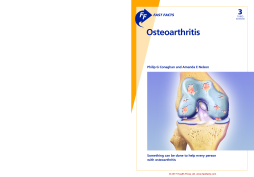
Additional Information
Book Details
Abstract
Osteoarthritis refers to a clinical syndrome of joint pain and stiffness with associated functional problems that have a substantial effect on quality of life. Worldwide, it is one of the most rapidly rising conditions associated with disability. Although there is no definitive treatment to prevent or halt the progress of OA, this new edition of Fast Facts: Osteoarthritis continues to support the view that something can be done to help every person with OA. In addition to well-established diagnostic criteria, this resource examines recent evidence-based recommendations for the use of modern imaging modalities, and an update on the latest genetic research. Optimum treatment generally involves the early application of non-pharmacological therapies, with a ‘step up’ approach to pharmacological interventions. Importantly, management must be tailored to the individual patient’s needs, depending on their comorbidities and risk factors. This resource provides a concise overview of current patient-focused management guidelines, including discussion of areas where guidelines diverge, such as the use of glucosamine and chondroitin, and intra-articular therapy.
Table of Contents
| Section Title | Page | Action | Price |
|---|---|---|---|
| Fast Facts: Osteoarthritis, 3rd edn | 1 | ||
| Title page | 2 | ||
| Table of contents | 4 | ||
| Introduction | 6 | ||
| CHAPTER 1: The normal synovial joint | 8 | ||
| CHAPTER 2: The OA joint | 18 | ||
| CHAPTER 3: Epidemiology | 30 | ||
| CHAPTER 4: Etiology | 40 | ||
| CHAPTER 5: Diagnosis | 54 | ||
| CHAPTER 6: Principles of management | 68 | ||
| CHAPTER 7: Non-pharmacological management | 74 | ||
| CHAPTER 8: Pharmacological management | 83 | ||
| CHAPTER 9: Intra-articular therapies | 90 | ||
| CHAPTER 10: Surgical management | 95 | ||
| CHAPTER 11: Developments | 103 | ||
| Useful resources | 109 | ||
| Index | 111 | ||
| Back cover | 114 |
